Why Title IX Still Matters
Jackie Peszynski ’24, co-chair of Yale SOM’s Title IX Working Group, looks back at the school’s third annual week of programming about Title IX and reflects on the legacy of the landmark law.
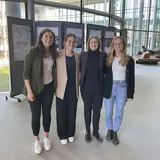
Title IX is just 37 words, and yet there is often confusion about what it means. In essence, it prevents sex-based discrimination in educational institutions or any organization in the United States that receives government funding. Though this outcome was unintended, the passing of Title IX in 1972 helped spark an explosion of women’s sports in this country, creating both academic and athletic opportunities for young women, especially in collegiate sports, and cascading down to all levels of sport. Indeed, the U.S. Olympic and Paralympic Committee President Sarah Hirshland made the connection between Title IX and the dominance of U.S. women at the 2020 Tokyo Olympics, where 59% of American medals were won by women despite women having fewer events to compete in.
Each February, Title IX Awareness Week aims to improve understanding of Title IX at Yale SOM and to help create an equal and healthy school environment for all who work or study here, regardless of sex and/or gender. During this year’s event (February 5–9), the SOM Title IX Working Group expanded on last year's programming with events highlighting the legal implications of Title IX, interactive workshops to support healthy conversations and relationships, and addressing coaching abuse in women’s sports. As someone who interned with the Boston Breakers of the National Women’s Soccer League (NWSL) in college and worked at U.S. Soccer before coming to SOM, I was particularly excited to welcome our keynote speakers, Molly Hensley-Clancy and Mana Shim, to campus (pictured above with Ellie Wachtel ’24 and me). Throughout the week we also hosted a drive to collect donations for IRIS, an agency whose mission is to help refugees and other displaced people establish new lives in Connecticut. Below, my classmates graciously share their reactions and takeaways from the week’s events.
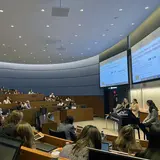
Monday, February 5
A Conversation with Molly Hensley-Clancy and Mana Shim
Molly Hensley-Clancy, a sports investigative reporter at the Washington Post
Mana Shim, a professional soccer player and chair of U.S. Soccer’s Participant Safety Taskforce
“Molly and Mana shared a story that was both poignant and empowering. Theirs is a story of bringing the truth and abuse to light and now working to create lasting change well beyond the professional soccer ranks.”—Ellie Wachtel ’24
“The event with Molly and Mana was one of the most powerful I have been to over the past two years at SOM. It was incredible to hear from two people on the forefront of necessary change in women’s sports.”—Daniel Joseph ’24
Title IX Voices
Voices is one of our most beloved traditions here at SOM, where speakers share their personal narratives under the agreement that “what is said here stays here.”
“As an international student new to the Title IX scene, Title IX week has been an eye-opener. On top of that, hearing my friends bring to light specific experiences through a unique platform like Voices only emphasized the urgency and importance of such awareness and empathetic conversation in the SOM community.”—Joandy Pratama ’24
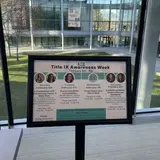
Tuesday, February 6
How to Have Better Conversations
Aley Menon, director of restorative practices at Yale
“This event reminded me that conversations are not just an exchange of information or dialogue, but also an exchange of emotional needs and important values between two people. I was able to identify values that I previously didn’t think were relevant to my ability to be a good conversationalist (e.g. the need for autonomy and independence). However, upon reflection, I realize that these values influence the direction and perception of the conversation. Going forward, I intend to treat conversations as an opportunity to both share my values and recognize the values and emotional needs of others.”—Britley Jones ’25
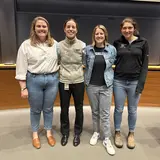
Wednesday, February 7
Social Impact Lab x Title IX Week
Ann-Marie Guglieri, executive deputy director and chief operating officer of Yale Athletics
“I appreciated Ann-Marie’s grounding of Title IX within a larger landscape of college athletics and higher education more broadly. As someone with experience and an interest in education, I know that Title IX and similar legislation have played a pivotal role in the shaping of the present-day higher education landscape. Ann-Marie helped further illuminate the throughline that Title IX has had in this space over the fifty-odd years. Further, I appreciated her insights about the future of college athletics and how more recent legislation has the potential to change the landscape once again.
“Social Impact Lab aims to highlight the various ways that speakers are driving impact in their fields while engaging students with the challenges that our speakers are facing and what they have learned along the way. While her talk may have more explicitly focused on the evolution of Title IX, many of her lessons are transferable to the spaces that SOM students will be operating in.”—Erin Manning ’24
“It was great to hear from Ann-Marie on the state of Title IX in women’s sports today, and also to engage with her in a discussion about the implications of NIL [the NCAA’s policy allowing student athletes to benefit from use of their name, image, and likeness] on the rapidly changing landscape of college sports, particularly as NIL sits outside the purview of Title IX.”—Burke Hall ’24
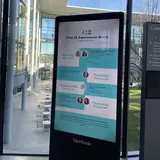
Thursday, February 8
Establishing Healthy Relationships and Boundaries
Erin Farley, manager of Title IX Prevention, Education, and Outreach at Yale
Sabrina Saint Juste, a clinician at the Sexual Harassment and Assault Response & Education (SHARE) Center
“It was helpful to discuss what boundary setting can look like in both personal and professional settings, especially because the discussion illustrated why each of us may have different boundaries. I also appreciated the ‘homework’ the speakers assigned to reflect on which healthy relationship behaviors are most important to each of us individually.”—Carolyn Perry ’24
“It's always great to discuss what healthy relationships and boundaries look like, because it's such a contextualized topic that it's important to step back and hear from others. Erin and Sabrina both provided tremendous insight while engaging the entire audience, bringing in a wealth of perspectives on how to manage healthy relationships in your personal and professional lives.”—Zach Humrich ’24



